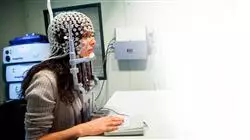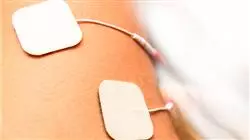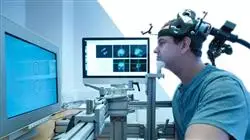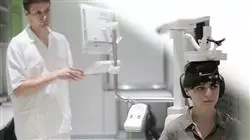University certificate
The world's largest faculty of medicine”
Description
Learn how to treat chronic pain such as fibromyalgia, herniated disc or sciatica and become a highly sought after and renowned practitioner"

Many chronic ailments afflict today's patients. Many of them are related to neurophysiological pathologies, so an approach from this field of knowledge is necessary to treat issues such as epilepsy, OSA or Parkinson's disease, among many others that hinder people's lives.
In addition, intraoperative neurophysiological monitoring has become so important in recent decades that it has even become a legal requirement for many procedures. This is because postoperative diagnostics, as well as the surgical procedures themselves, are greatly benefited by using this technique.
Given the importance of these two fields, it is an interesting avenue for professional growth for all physicians who aspire to increase the level of their careers. Thanks to this TECH postgraduate diploma, the graduate will have a more complete understanding of therapeutic neurophysiology, its applications in common pathologies in patients and how to use it to monitor surgeries of varying complexity.
This will allow the student not only to access a higher level of knowledge, but even a higher level in his or her professional field. The student even has the convenience of being able to study this course completely online, without the need to attend physical classes or adhere to specific schedules, being able to combine it with daily activities and work.
You will be prepared to make a quality leap in the medical field by adding this postgraduate diploma in Evoked Potentials, Intraoperative Monitoring and Neurophysiological Techniques for Therapeutic Purposes to your curriculum"
This postgraduate diploma in Evoked Potentials, Intraoperative Monitoring and Neurophysiological Techniques for Therapeutic Purposes contains the most complete and up to date scientific program on the market. The most important features include:
- The development of case studies presented by physicians with expertise in neurophysiology for therapeutic purposes
- The graphic, schematic, and eminently practical contents with which they are created, provide scientific and practical information on the disciplines that are essential for professional practice
- Practical exercises where self-assessment can be used to improve learning
- Its special emphasis on innovative methodologies
- Theoretical lessons, questions to the expert, debate forums on controversial topics, and individual reflection assignments
- Content that is accessible from any fixed or portable device with an Internet connection
Forget old-fashioned programs that require your total devotion and join TECH's educational future where you are the one who sets the pace of study"
The program’s teaching staff includes professionals from the sector who contribute their work experience to this training program, as well as renowned specialists from leading societies and prestigious universities.
The multimedia content, developed with the latest educational technology, will provide the professional with situated and contextual learning, i.e., a simulated environment that will provide immersive training programmed to train in real situations.
This program is designed around Problem Based Learning, whereby the professional must try to solve the different professional practice situations that arise during the academic year. For this purpose, the student will be assisted by an innovative interactive video system created by renowned and experienced experts.
You will become a more prestigious doctor thanks to the new neurophysiological techniques that you will apply to your patients with more severe pain"

Lay the foundation for a medical future that is more relevant to you by enrolling in this postgraduate diploma today"
Objectives
A professional and salary increase is the goal of students who decide to undertake this postgraduate diploma. TECH is aware of this, so all efforts are focused on offering students a guaranteed education, which allows them to access the job improvements they seek in the shortest possible time. Thanks to the improvement of professional and transversal competencies that the students will receive, they will have a quality guarantee to access better positions within the medical field.

This program will prepare you professionally and personally in the healthcare field that can assure you the best future"
General Objectives
- Obtain a global and updated vision of Neurophysiologic diagnosis in its different training areas, allowing the student to acquire useful and updated knowledge, homogenize criteria following national and international standards
- Generate in students the desire to broaden their knowledge and apply what they have learned to daily practice, to the development of new diagnostic indications and to research
Specific Objectives
Module 1. Evoked Potentials
- Deepen their knowledge of the basis for obtaining the different evoked potentials
- Decide on the most appropriate techniques for the diagnosis of different pathologies
- Be able to interpret the results of the same
- International guidelines for the performance of evoked potentials are available
- Deepen the understanding of the most common programs for the design of appropriate paradigms for the acquisition of cognitive evoked potentials
- We delve into the peculiarities and differences in the use of evoked potentials in the pediatric age group and in the critical patient setting
Module 2. Intraoperative Neurophysiological Monitoring
- We will deepen in the concepts of intraoperative neurophysiological techniques
- Theoretical and practical knowledge in the interpretation of neurophysiological signals applied to the surgical field and the anesthetized patient
- Importance of alarm values and their correlation with postoperative clinical changes
- Update on guidelines and protocols
- Acquire the ability to plan, perform and evaluate multimodal neurophysiological techniques applied to the different fields of the surgical field
Module 3. Neurophysiological Techniques for Therapeutic Purposes. Invasive and Non-invasive Neuromodulation. Botulinum Toxin
- Deepen in detail the physiological basis of the different techniques of invasive and non-invasive brain stimulation
- Deepen understanding of the most commonly used indications of the different invasive and non-invasive brain stimulation techniques
- Acquire the neurophysiological basis of direct cortical stimulation and its specific indications in the treatment of drug-resistant chronic pain
- Learn the application protocols of direct cortical stimulation in the treatment of drug-resistant chronic pain
- Acquire the neurophysiological basis of spinal cord stimulation and its specific indications in the treatment of chronic pain and other applications
- Learn the application protocols of spinal cord stimulation in the treatment of chronic pain
- Know the role of neuromodulation in the field of epilepsy, as well as its diagnostic applications
- Acquire the neurophysiological basis of brain stimulation in the diagnosis of epilepsy
- Acquire the neurophysiological basis of brain stimulation in the treatment of epilepsy
- Know the diagnostic indications of brain stimulation in epilepsy
- Know the therapeutic indications of brain stimulation in epilepsy
- Understanding the role of deep brain stimulation (DBS) in Parkinson's disease (PD) and other movement disorders
- Learn the physiological basis of deep brain stimulation (DBS)
- Learn the technique and clinical indications of DBS in Parkinson's disease and other movement disorders
- Know the basis and physiological effects of vagus nerve stimulation
- Learn the technique and clinical indications of vagus nerve stimulation
- Knowing the effect of vagus nerve stimulation in patients diagnosed with epilepsy
- Know the physiological basis and effects of hypoglossal nerve stimulation
- Learn the technique and clinical indications of hypoglossal nerve stimulation
- Knowing the effect of hypoglossal nerve stimulation in patients diagnosed with OSAHS
- Know the basis and physiological effects of stimulation of other peripheral nerves such as the trigeminal, occipital, tibial and sacral nerves
- Learn the techniques and clinical indications of trigeminal, occipital, tibial and sacral nerve stimulation
- Understand the fundamentals and basics of how hearing implants work
- Know the types of hearing implants: cochlear and brainstem
- Learn the indications for hearing implant implantation
- Know the physiological basis of non-invasive brain stimulation
- Learn the types of non-invasive brain stimulation: direct transcranial electrical stimulation (TES) and transcranial magnetic stimulation (TMS)
- Learn the indications for non-invasive brain stimulation
- Know the scientific evidence supporting non-invasive brain stimulation and learn the most applied therapeutic protocols
- Know the fundamentals, the basis of operation and the modalities of transcutaneous electrical nerve stimulation (TENS)
- Learn the indications, contraindications and effects of TENS
- Know the mechanism of action of botulinum toxin
- Learn the therapeutic and adverse effects of botulinum toxin
- Learn the technique of botulinum toxin application with guidance by neurophysiological techniques in different dystonia such as cervical dystonia, blepharospasm, facial myokymias, oromandibular dystonia, upper extremity dystonia and trunk dystonia
- Acquire theoretical knowledge (definitions, indications and implementation protocols), as well as training for the practical implementation of personalized neuromodulation therapies according to the indication of the clinical case and following clinical protocols
- Understand neuromodulation therapies as an adjuvant treatment that is pat of a multidisciplinary whole, and not as a treatment in exclusivity

TECH will exceed even your best expectations when you access this postgraduate diploma and see for yourself the quality of teachers and syllabus"
Postgraduate Diploma in Evoked Potentials, Intraoperative Monitoring and Neurophysiological Techniques for Therapeutic Purposes.
Evoked potentials, intraoperative monitoring and neurophysiological techniques for therapeutic purposes are tools used in veterinary medicine to diagnose and treat a variety of neurological conditions and other diseases. Evoked potentials are techniques for recording the electrical activity of the central nervous system in response to an external stimulus, such as a sound signal or a flash of light. These potentials can be used to diagnose specific neurological disorders, such as epilepsy, myasthenia gravis and optic neuropathy. Intraoperative monitoring is used during surgery to assess and minimize the risk of neurological damage. During spinal or brain surgery, evoked potentials, spontaneous movements and muscle activity can be monitored to detect any changes in the normal functioning of the nervous system. This can help surgeons adjust the course of surgery to avoid neurological injury.
Neurophysiological techniques for therapeutic purposes include transcutaneous electrical nerve stimulation (TENS) and neurological rehabilitation. TENS uses low-frequency electrical currents to stimulate peripheral nerves, relieving pain and improving muscle function and range of motion. Neurological rehabilitation includes exercises and physical therapy designed to help patients regain strength and movement after neurological injury or surgery. Evoked potentials, intraoperative monitoring and neurophysiological techniques for therapeutic purposes are tools used to diagnose and treat a variety of neurological conditions and other diseases. They are advanced tools that can help veterinarians provide more accurate and effective treatments for their patients. TECH, the world's largest digital university, has a specialized academic program designed to provide students with solid skills in neurophysiology and related therapeutic techniques for the prevention, diagnosis, treatment and rehabilitation of neurological disorders. Students will learn to apply advanced neurophysiology techniques to monitor and improve neurological function.







